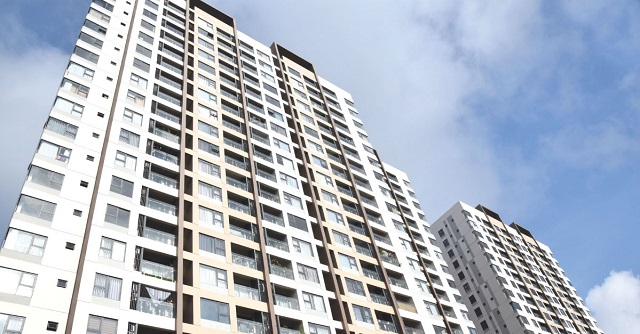Real Estate Lending – Challenges Persist
As of June 24, 2024, total credit outstanding in the economy increased by only 4.45% compared to the end of 2023, averaging a monthly growth of 0.73%, according to the General Statistics Office. However, credit growth only started to pick up from March 2024. In the first two months of the year, credit outstanding declined month-on-month and compared to the end of 2023.
Notably, many sectors with large credit balances, such as real estate and construction, have stalled due to weak capital absorption, dragging down credit demand.

The decline in home loan demand among citizens has significantly impacted the credit growth in the real estate sector. Illustration: Le Vu
|
On the sidelines of a recent finance conference, Mr. Pham Nhu Anh, CEO of MB, stated that out of the four loan segments in the real estate sector, including lending to citizens for home purchases, lending for industrial real estate development, residential projects, and resort real estate, three segments are facing challenges.
Regarding lending to citizens for home purchases, Mr. Anh acknowledged that demand for home purchases and upgrades in the first six months has been slow due to economic difficulties and declining incomes. As a result, the retail credit of banks, including MB, has been affected.
According to Mr. Anh, this situation is concerning as retail lending is a strategic focus for joint-stock banks.
A similar situation occurred at Vietcombank, where retail credit outstanding, accounting for nearly 20% of total outstanding credit, mostly for home purchases, has continuously declined. This has impacted the bank’s retail credit growth.
Mr. Nguyen Thanh Tung, CEO of Vietcombank, attributed the decline in home lending to the real estate market’s legal complexities, limited supply, and declining incomes. In this context, a cautious sentiment continues to prevail in the market.
In addition to objective factors, another reason for the slow growth in real estate credit is the increased prudence of banks in personal lending. The leader of a joint-stock commercial bank shared that previously, the bank lent up to 70% of the value of the secured asset, but now it only lends about 50%. Moreover, the valuation of collateral is more stringent, putting pressure on homebuyers in terms of self-financing.
Regarding resort real estate, MB representatives stated that demand for this segment has not recovered as tourist arrivals have only partially rebounded compared to pre-COVID-19 levels, while the supply of resort real estate is excessive. Meanwhile, legal obstacles persist in the segment of lending for residential project development.
“Recently, the Government and ministries and sectors have been focusing on resolving this issue. However, we are still in the process, and the actual effectiveness may take longer,” said Mr. Anh.
What to Expect from the Three Real Estate-Related Laws?
With a credit growth target of around 15.5% for the year, MB expects to achieve an 8% growth rate in the last six months. However, to attain this goal, Mr. Pham Nhu Anh emphasized the need for comprehensive solutions, along with waiting for the economy to absorb capital, especially as interest rates have already been adjusted to their lowest levels in the past decade.
Vietcombank, on the other hand, plans to focus its resources on industrial real estate, key projects, FDI enterprises, and export-oriented manufacturers. The bank has set a credit growth target of 8.2% by September 30 and 12% by December 31.
Vietcombank’s representative emphasized that the failure to meet credit growth plans is not solely due to banks’ intentions but also depends on the economy’s ability to absorb capital. Therefore, support is needed from ministries, sectors, and localities in licensing and addressing difficulties and obstacles for projects.

Credit growth for the year depends significantly on the recovery of the economy and the real estate sector. Photo: LE VU |
The Real Estate Business Law and the Land Law, which will take effect on August 1, 2024, and the Law on Credit Institutions, effective from July 1, 2024, are expected to positively impact real estate credit and the overall economy.
Specifically, housing credit, which includes loans for home purchases and self-use purposes, accounts for the highest proportion of total real estate credit outstanding. In Ho Chi Minh City, the largest market in the country, housing credit accounts for 67.78% of total real estate credit outstanding.
The growth of this segment, which increased by 1.2% in May (after negative growth in previous months – PV), contributed to the 1.15% growth of real estate credit in May 2024 compared to April. It also brought the outstanding credit balance to 992.8 trillion VND, equivalent to 28% of the total outstanding credit in Ho Chi Minh City.
Therefore, the growth of this segment not only boosts real estate credit growth but also has the potential to stimulate lending and meet the housing needs of citizens. This growth also positively impacts the real estate market and economic growth.
Mr. Nguyen Van Dinh, a real estate legal expert, expects that the new laws, which the National Assembly has allowed to take effect early, will address the “conservative and waiting” mindset of officials. For instance, the issue of “whether enterprises need to bid or auction when changing the purpose of land use” has been specifically addressed in the amended Land Law, giving officials peace of mind when making decisions and saving time and costs for citizens and enterprises.
The Real Estate Business Law introduces stricter regulations on the subdivision of land plots for sale to individuals, compelling enterprises to focus their resources on constructing houses and engineering works instead of borrowing capital for infrastructure development and speculative purposes.
In addition to efforts to tighten land subdivision, the law introduces a new real estate business form, “Transfer of land use rights with technical infrastructure in real estate projects to organizations for investment in the construction of houses and engineering works.” This new form, which targets organizations and real estate businesses, is expected to boost M&A activities in real estate projects, making the market more vibrant, according to Mr. Dinh.
Adding to this assessment, experts from PwC Vietnam noted that the law has set out specific conditions, including the ability to separate project components and resolve prior mortgages before transferring ownership. The clear transfer procedures could enhance market liquidity, creating opportunities for buy-out or divestment activities by real estate businesses, thereby stimulating capital demand in this market.
Moreover, the Real Estate Business Law creates opportunities for introducing new real estate products by expanding the range of assets to include existing and future projects. As a result, most real estate can now be sold “on paper,” facilitating capital mobilization from banks for enterprises.
Additionally, the amended Law on Credit Institutions enables credit institutions to transfer real estate projects as collateral to meet stringent conditions for handling bad debts. This is expected to facilitate debt recovery and reduce non-performing loans in the real estate sector.
Van Phong
VPBank strengthens its system in 2023, laying the foundation for sustainable growth
By 2023, VPBank has made significant strides in expanding its customer base and scaling up its operations. The bank has managed to make progress amidst challenging macroeconomic conditions, focusing its resources on strengthening its system and building momentum for sustainable growth in 2024 and beyond.
Removing Land Policy Bottlenecks, Creating New Resources for Development
The passing of the Land Law by the National Assembly has been well-received by society, with expectations that policy barriers and bottlenecks will be quickly dismantled and eliminated. This will effectively utilize land resources, contributing to the creation of new resources that will promote socio-economic development…


















